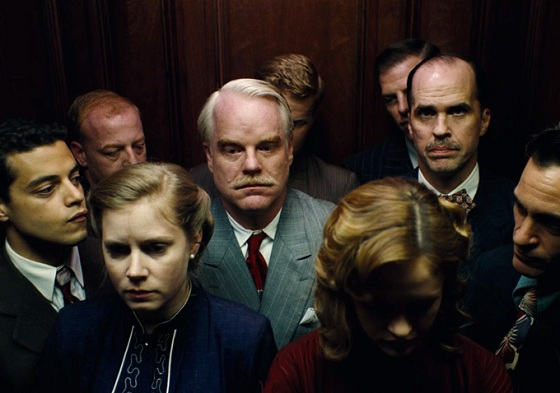Written by Brennan

It has been 5 years since There Will Be Blood, Paul Thomas Anderson’s modern masterpiece. It goes without saying that the half-decade and enormous critical success of the film had raised expectations for The Master to astronomical heights. Did PTA deliver? I wish I could give a definitive answer but alas, I cannot. The Master is both complex and difficult to digest, and while writing about it after only one viewing may prove be a futile effort, I will do my best.
The Master is a story of two men in post-WWII America. Freddie Quell (Joaquin Phoenix) is an alcoholic veteran who suffers from what is implied to be post-traumatic stress disorder, and is struggling mightily to adjust to civilian life. Lancaster Dodd (aka The Master or Master, played by Philip Seymour Hoffman) is a charismatic leader of the newly-formed philosophical movement called “The Cause”. The two men meet by chance on Lancaster’s yacht, where The Master takes a liking to Freddie and brings him into the movement.

The two main characters interact throughout the film, but taken in hindsight the two men have different stories, linked together by their inescapable need for each other. The two being near opposites, their relationship brings to light one of the many themes of The Master: the disturbed and weak’s need to follow and to be told what to do and how to live by an almost god-like leader, and the leader’s need for praise and devoted service of the weak. Many critics have said that PTA has taken a role of critic and portrayer of the American story with There Will Be Blood, showing the greed and coldness of capitalism and the devoted pious, and the strained and paradoxical relationship between the two. The Master continues this exposition of America by showing the conflict between the rugged individualism that pervades American culture, with the contradicting need to follow and trust explicitly a charismatic and confident leader.
PTA succeeds in striking a distinct visual style (one of the many great traits of There Will Be Blood). The Master is true to it’s time period but feels very different from other movies that are set in the 1950’s America. The Master is grittier and greasier, much of this stems from Freddie, who is gangly, unkempt and sickly-looking. The pristine vision we have of the 50’s does not exist in The Master, and as a result the movie is not a comfortable watch. That fact, along with Jonny Greenwood’s characteristically brilliant modern soundtrack and the erratic nature of Freddie makes for a suspenseful and uneasy viewing experience.

Aside from the style of the movie, the other great strength is its acting. Both Philip Seymour Hoffman and Joaquin Phoenix give incredible performances, both actors bringing their characters to life. Hoffman is absolutely convincing as an organized, sociable, articulate and beloved leader, and Phoenix is reptilian and disturbed, I could hardly recognize him when I first saw the trailer. Look for both great actors to receive attention come Oscar season. It would be an injustice if I didn’t mention Amy Adam’s excellent take on Lancaster’s stiff, cold wife, which is a huge contrast from Adam’s usual warm and likable characters.
Despite considerable strengths, The Master has an unfortunate amount of weaknesses. While There Will Be Blood seemed to meander without focus at first viewing, in retrospect a clear story is being told in Daniel Plainview’s gradual descent into greed and hate, with strong themes and tone. Likewise, The Master meanders, but upon conclusion it is not clear what the story was about. The themes are loose and the tone seems to jump around, as the viewer struggles to decide what to make of this challenging, 143-minute marathon. I do believe that The Master may have growing potential, as critics and film fans revisit The Master in years to come, its significance and meaning may develop and turn PTA’s latest into one of the best films of 2012.
Did you enjoy this review? Click here for more reviews by Brennan



















